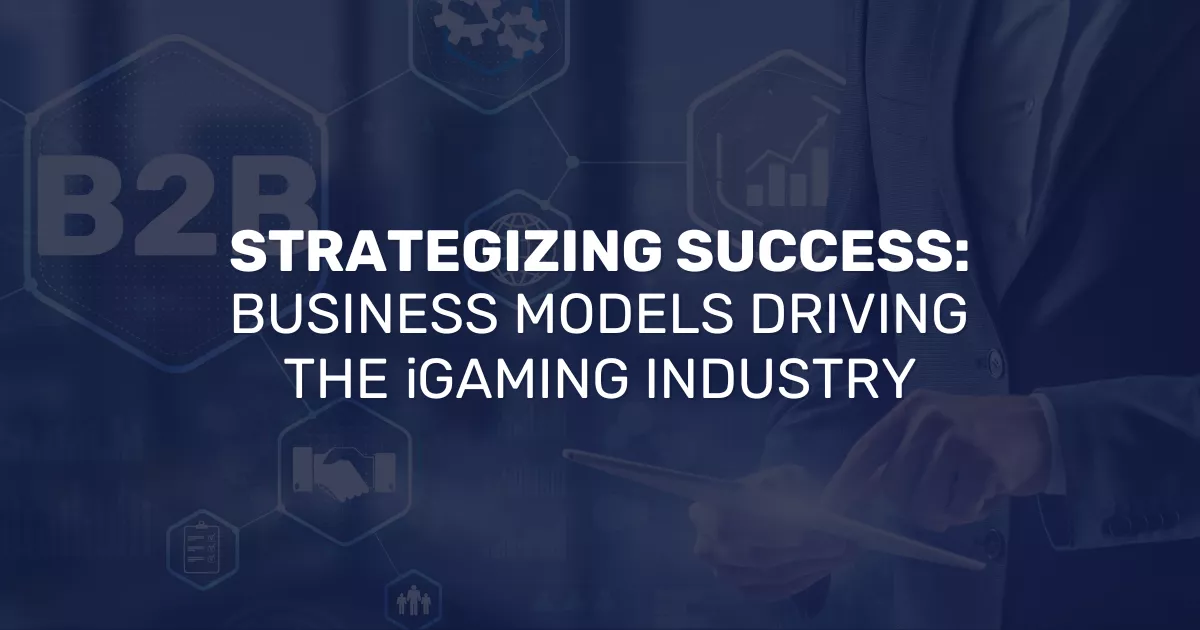Interviews & Editorials
Strategizing Success: Business Models Driving the iGaming Industry

The iGaming industry, a dynamic and ever-evolving sector, has carved a prominent niche for itself within the global economy. As it continues to gain traction, the intricacies of its business models play a pivotal role in shaping its trajectory.
From direct-to-player offerings to backend infrastructure providers, from affiliate marketing dynamics to the complexities of hybrid models, the iGaming sector presents a fascinating interplay of strategies and operations. Add to this the overlay of regional regulations and technological innovations, and it becomes clear that understanding its business models is key to grasping its current state and potential future.
The Landscape of iGaming Business Models #
B2C Models (Direct-to-Player) #

The Business-to-Consumer (B2C) model in the iGaming industry refers to businesses/operators offering services and products directly to individual players. It distinguishes itself from other models by its primary focus on the end user.
Operational blueprint: B2C platforms prioritize a rich user experience, offering different interactive games and strategic bets. Stability is key, ensuring uninterrupted gameplay, in-game betting and other activities, as any disruptions can harm user trust and revenue. To maintain engagement, these platforms provide a mix of classic and innovative services, encouraging customers to return regularly.
The revenue rundown: The primary revenue for B2C platforms comes from the games and various betting avenues. VIP players provide another major revenue stream, enjoying perks like freebets, cashbacks, and exclusive features such as instant support and higher withdrawal limits. The more a player spends, the better the benefits they receive, encouraging higher spending and increasing profits for the platform.
B2B Models (Infrastructure and Software Providers) #

While B2C platforms are the iGaming industry's face, Business-to-Business (B2B) entities serve as its backbone, providing the foundational support that allows these platforms to function optimally. Companies like NSoft are industry leaders in this space, providing critical technology, software, and services that B2C platforms rely on.
Operational blueprint: B2B entities in the iGaming sector play a multifaceted role in bolstering B2C platforms. Through studying gaming trends, they create engaging software (whether in-house like NSoft or by outsourcing game developers) and, using advanced encryption, they guarantee secure payments. They provide robust customer management by integrating cloud databases with AI analytics tools. To further support B2C operations, they offer consultancy, market insights, and strategies for scaling. Depending on the company, this suite can expand further, catering to specific needs and niches within the industry.
The revenue rundown: B2B providers’ revenue streams are multifaceted: they can license software based on user numbers or transaction volumes; offer premium-priced customized solutions; engage in strategic partnerships for fixed fees; and adopt subscription models. Additionally, they might charge per-transaction fees for specific services, sell white-label solutions for B2C customization, provide tiered service packages, and even engage in revenue-sharing agreements where a portion of the B2C platform's earnings from a B2B product or service flows back to the B2B provider.
Affiliate Marketing in iGaming #

Industry interlink: In the iGaming sector, affiliates are essential partners for operators. They promote gaming platforms using tools like reviews, rankings, and bonuses, directing potential players to these platforms. In return, these platforms compensate affiliates based on the generated traffic, player sign-ups, or revenue, effectively creating a symbiotic relationship centered around player acquisition and revenue generation.
Conversion mechanics: The primary role of an affiliate is to channel potential players to iGaming platforms. They achieve this by spotlighting promotions, offering exclusive bonuses, or providing players with valuable insights. Depending on the agreement, affiliates may earn a commission via Cost Per Acquisition (CPA), where they receive a fee for each referred player, Revenue Share, which grants them a portion of the revenue generated by their referred players, or hybrid deals that combine both.
Trust trajectory: The cornerstone of successful affiliate marketing in iGaming is trust. Affiliates hold a dual responsibility: to provide genuine, reliable information to players and to uphold the reputations of the platforms they promote. A balanced approach ensures they attract quality players for iGaming platforms while maintaining their credibility. This delicate balance, shaped by transparency and authenticity, defines the trajectory of their success in the industry.
Emergence and Success of Hybrid Models #
As the iGaming industry matures, there's a clear trend towards diversification. Platforms are no longer content with sticking to a single business model but are instead blending elements from various models to maximize revenue and user engagement.
Model mashup: Hybrid models often combine direct-to-player games with affiliate marketing components or merge elements of B2C and B2B offerings. For instance, an iGaming platform might offer games to end-users while also providing white-label solutions to other businesses.
Economic implications: Hybrid models can potentially tap into multiple revenue streams. For instance, a platform might earn from player transactions while also licensing its proprietary games to other platforms. This diversification can lead to more stable revenue, especially in an industry that's influenced by rapidly changing tech trends and user behaviors.
The Regulatory Dynamics and Their Impact #

Regulatory landscape: iGaming business models are shaped not only by technology and market demand but significantly by the rules set by regulatory bodies worldwide. These entities dictate the parameters within which iGaming platforms operate, ensuring ethical practices while still fostering industry growth. Distinctive regulatory approaches adopted by countries - from open acceptance with clear licensing procedures to restrictive oversight - influence the strategies companies adopt in their business models.
The ripple effect: The regulatory environment directly affects the financial viability of an iGaming platform's business model. High licensing costs may sway the entry of startups, funneling the market towards monopolistic tendencies with dominant players. Tax structures, another critical regulatory aspect, can thin profit margins. Platforms might need to recalibrate their revenue strategies, sometimes transferring additional costs to consumers, to counterbalance the financial weight of stiff taxation. Moreover, in areas where there are stringent restrictions on iGaming promotions, the affiliate marketing business model may need to evolve or pivot to remain viable.
Strategic navigations: Thriving in this regulatory maze demands adaptability from iGaming platforms. Engaging proactively with regulators can offer a clearer understanding of evolving rules, ensuring platforms stay ahead of the curve. Additionally, for platforms aiming at sustained growth, a geographically diversified presence can serve as a strategic move, offsetting potential regulatory crackdowns in primary markets. From a technological standpoint, platforms might deploy solutions like geofencing to adhere to regional restrictions, showing the intricate interplay between business model adaptations and regulatory compliance.
Present Challenges and Future Avenues #
Bumps on the road: In the iGaming industry, balancing profitability and user experience becomes challenging as consumer tastes evolve, with platforms often torn between paywalls, microtransactions, and subscriptions. Models reliant on affiliate marketing, despite their potential, grapple with scalability and tech limitations. The choice between diversification, which might dilute a platform's essence, and specialization, which can miss broader opportunities, further complicates the landscape. Additionally, diverse regional regulations pose compliance challenges, necessitating significant time and resources.
Bright horizons: The iGaming sector brims with growth potential. There's a move towards localized models tailored to regional preferences and regulations. Leveraging blockchain technology, the industry eyes decentralized platforms, offering users more control and novel revenue avenues. Prioritizing community engagement can directly boost profits, seen in avenues like gamification tools and user-generated content. Furthermore, B2B aspects of the sector are transitioning from service sales to revenue-sharing collaborations with B2C entities, highlighting mutual expansion opportunities.
Conclusion: The Evolving iGaming Ecosystem #
The multifaceted landscape of iGaming showcases the adaptability and innovation inherent in modern industries. As platforms continuously pivot, evolve, and adapt to meet consumer demands, regulatory needs, and technological advancements, the industry stands as a testament to the resilience and creativity of the global economy. The challenges ahead, while significant, are matched by vast opportunities. As iGaming platforms find new ways to engage users, collaborate across B2B and B2C channels, and navigate the regulatory maze, the sector's future promises continued growth and transformation.
Tags:
Related Articles
Interviews & Editorials
09.02.2022.
NSoft exceeds growth expectations, delivering strong Q4 2021 results
The entire 2021 was shaped to fit our further development and the expansion of the business, therefore the Q4 2021 was a worthy closure.
Learn more
Interviews & Editorials
25.01.2022.
NSoft - an exciting short story about moving forward in 2022
Our web played a significant role in the 2021 success story. And right here, right now, you are a part of this story.
Learn more
Interviews & Editorials
01.12.2021.
Revenue sharing business model
NSoft CFO, Igor Marković exclusively for Gambling Insider on his insight into revenue-sharing business models in the betting industry
In the overview, Marković argues that this business model works for NSoft and its clients as it transforms cooperation into partnership.
Learn more
Didn’t Find What You’re Looking For?
Our team will be happy to guide you through our products and services.
Contact us
